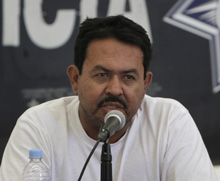New York, August 2, 2010—All four Mexican journalists abducted by drug traffickers last week are now free, ending an ordeal that drew international attention to pervasive anti-press violence in Mexico. Two reporters were brought to safety by federal police on Saturday, joining two colleagues who had been freed earlier.
Javier Canales, a cameraman for the national media group Milenio, and Alejandro Hernández, a cameraman for the national network Televisa, were found before dawn Saturday in a house in the city of Gómez Palacio, local and international news reports said. The kidnappers were able to escape as police approached, according to Mexican law enforcement officials.
“One can say that we have been born again,” said Canales at a press conference shortly after being brought to safety. The reporters had been taken captives along with Héctor Gordoa, a cameraman for Televisa, on the afternoon of July 26 while covering protests organized by prisoners and their families at a detention center in Gómez Palacio, the Milenio Group reported. Gordoa was released unharmed on Thursday.
Oscar Solís, a reporter for the local newspaper El Vespertino, was kidnapped separately on July 26 but held captive with the other reporters. Solís was also released last week, according to The Associated Press.
“We are relieved that the four reporters are free after a tense period in captivity,” said Carlos Lauría, CPJ’s senior program coordinator for the Americas. “The federal government must conduct an exhaustive and timely investigation over the abduction and punish those responsible with the full extent of the law.”
Shortly after the kidnapping, the captors demanded that Televisa and Milenio air three videos in exchange for the journalists’ freedom. The videos showed two men who said they worked for the Zetas criminal group, and another man identified as a police officer. The three, who appeared to be under duress, revealed alleged links between local officials and the Zetas.
Both Televisa and Milenio broadcast the videos last week, news managers told CPJ. Organized crime groups regularly threaten, attack, and murder journalists who don’t slant news coverage their way, CPJ research shows, but this was the first documented case in Mexico in which journalists were taken hostage to force news organizations to broadcast a criminal group’s propaganda.
“Mexican authorities cannot allow criminal groups to control the flow of information. Citizens’ right to free expression and the stability of Mexican democracy are both at stake,” Lauría said.
Mexico is one of the world’s most dangerous countries for the press, CPJ research shows. More than 30 journalists have been killed and disappeared since President Felipe Calderón came to power in 2006.
